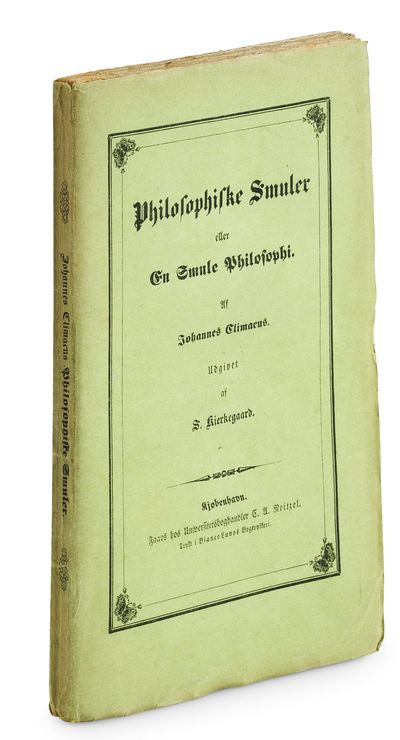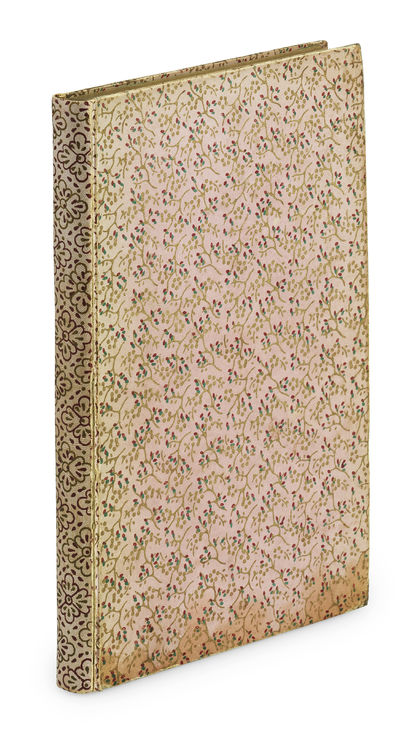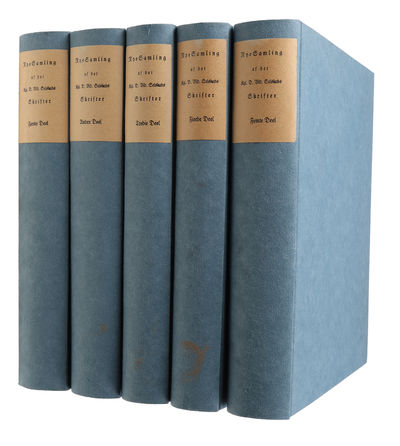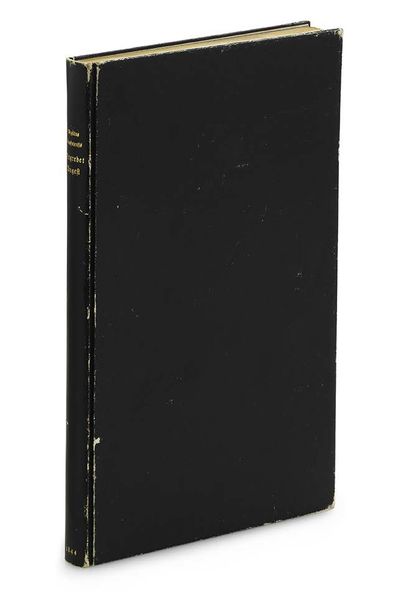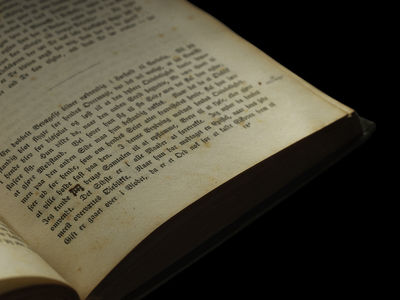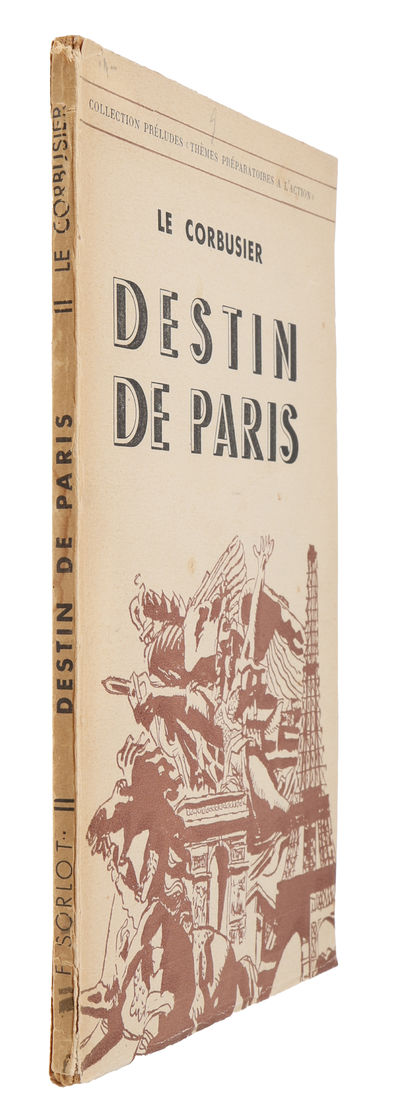GROTIUS, (HUGO).
Le Droit de la Guerre et de la Paix. Divisé en trois livres, Où il explique le Droit de la Nature, le droit des Gens, & les principaux Points du Droit public, ou qui concerne le gouvernement public d'un Etat. Traduit dy Latin en Francois, par Monsieu... - [THE FOUNDATION OF INTERNATIONAL LAW]
Herman H. J. Lynge & Søn A/S
lyn51671
Paris, Arnould Seneuze, 1687. 4to. Two contemporary uniform full calf bindings with five raised bands to richly gilt spines. All edges of boards gilt. Hinges and capitals worn, with some loss, but still tight. A damp stain to first and last leaves of both volumes (affecting about 17 leaves in all, mostly marginal). Otherwise a nice and clean copy with just the occassional brownspotting. Engraved frontispiece in vol. 1, engraved title-vignettes, large engraved vignette to verso of title-page of vol. 1, engraved portrait in vol. 1, woodcut vignettes and initials. Printed on good paper and with wide margins. (48), 621, (3) pp. + frontispiece and portrait; (4), 197, (3) pp.
The very rare first edition of the first French translation of Grotius' groundbreaking magnum opus, "De Jure Belli ac Pacis", the founding work of international law. The profoundly influential masterpiece - written during the Thirty Years' War, in the hope that rational human beings might be able to agree to legal limits on war's destruction - "made him famous throughout Europe... [t]he questions which he put forward have come to be the basis of the ultimate view of land and society. This was the first attempt to lay down a principle of right, and a basis for society and government, outside Church or Scripture... Grotius's principle of an immutable law, which God can no more alter than a mathematical axiom, was the first expression of the "droit naturel", the natural law which exercised the great political theorists of the eighteenth century, and is the foundation of modern international law." (PMM 125). This magnum opus of legal philosophy played a tremendous role in French law and politics and in the entire development of international law in general. "It is on the DIB (De Iure Bellis) that the bulk of Grotius' reputation rests. It consists of an introduction and three books, totaling more than 900 pages in translation. As with DIP, the introduction or "Prolegomena" holds the greatest interest for philosophers, for it is here that Grotius articulates and defends the philosophical foundations of the DIB. While philosophers are naturally attracted to the "Prolegomena," the body of the DIB is also redolent with themes of philosophical interest. Book One defines the concept of war, argues for the legitimacy of war, and identifies who may legitimately wage war. Book Two deals with the causes of war, the origins of property, the transfer of rights and more, while Book Three is dedicated primarily to the rightful conduct of belligerents in war. After the initial publication in 1625, Grotius ushered several more editions to press during his life, each time adding more references without substantially changing the arguments." (SEP).Living in the times of the Eighty Years' War between Spain and the Netherlands and the Thirty Years' War between Catholic and Protestant European nations (Catholic France being in the otherwise Protestant camp), Grotius was deeply concerned with matters of conflicts between nations and religions. His magnum opus was a monumental effort to restrain such conflicts on the basis of a broad moral consensus. It was begun in prison and published during his exile in Paris. "In the dedication of his great work, "De Jure Belli ac Pacis", to Louis XIII of France, Grotius addresses the king as "everywhere known by the name Just no less than that of Louis ... Just, when you call back to life laws that are on the verge of burial, and with all your strength set yourself against the trend of an age which is rushing headlong to destruction; ... when you offer no violence to souls that hold views different from your own in matter of religion; ... when by the exercise of your authority you lighten the burden of oppressed peoples."When writing this dedication and the Prolegomena to "De Jure Belli ac Pacis" (originally published in Paris in 1625), Grotius was living in exile. Europe was war-torn and depression and suffering from hunger and cold prevailed in many regions, justifying Grotius' description of international law as such: "in our day, as in former times, there is no lack of men who view this branch of law with contempt as having no reality outside of an empty name." The treaty of peace, embodying many of the universal and permanent principles which Grotius abstracted "from every particular fact" in those dark days of the early part of the Thirty Years' War, was not concluded till 23 years later. The year 1624 was, in the negotiation of the treaty, assumed to be the norm year for restoration of the "Status quo".The more than three centuries since Grotius wrote his magnum opus seem to bear witness to his views upon war peace, in spite of the fact that many a state has not yet realized that the state is "Truly fortunate which has justice for its own boundary line." In 1625 Grotius famously stated: "there is no state so powerful that it may not sometime need the help of others outside itself, either for the purposes of trade, or even ward off the forces of many foreign nations united against it."Grotius's paramount influence upon international law is widely acknowledged worldwide. For instance, since 1999 the American Society of International Law holds an annual series of Grotius Lectures. Because of his theological underpinning of free trade, he is also considered an "economic theologist"."To those desirous of understanding the fundamental principles which have motivated some of the greatest statesmen of modern time and the bases upon which a state which is to remain essentially sound must rest, a reading of Grotius' Prolegomena to the "Law of War and Peace" is commended." (George Grafton Wilson: "Grotius: Law of War and Peace.", p. 1. In: The American Journal of International Law, vol. 35, nr. 2, 1941).
The very rare first edition of the first French translation of Grotius' groundbreaking magnum opus, "De Jure Belli ac Pacis", the founding work of international law. The profoundly influential masterpiece - written during the Thirty Years' War, in the hope that rational human beings might be able to agree to legal limits on war's destruction - "made him famous throughout Europe... [t]he questions which he put forward have come to be the basis of the ultimate view of land and society. This was the first attempt to lay down a principle of right, and a basis for society and government, outside Church or Scripture... Grotius's principle of an immutable law, which God can no more alter than a mathematical axiom, was the first expression of the "droit naturel", the natural law which exercised the great political theorists of the eighteenth century, and is the foundation of modern international law." (PMM 125). This magnum opus of legal philosophy played a tremendous role in French law and politics and in the entire development of international law in general. "It is on the DIB (De Iure Bellis) that the bulk of Grotius' reputation rests. It consists of an introduction and three books, totaling more than 900 pages in translation. As with DIP, the introduction or "Prolegomena" holds the greatest interest for philosophers, for it is here that Grotius articulates and defends the philosophical foundations of the DIB. While philosophers are naturally attracted to the "Prolegomena," the body of the DIB is also redolent with themes of philosophical interest. Book One defines the concept of war, argues for the legitimacy of war, and identifies who may legitimately wage war. Book Two deals with the causes of war, the origins of property, the transfer of rights and more, while Book Three is dedicated primarily to the rightful conduct of belligerents in war. After the initial publication in 1625, Grotius ushered several more editions to press during his life, each time adding more references without substantially changing the arguments." (SEP).Living in the times of the Eighty Years' War between Spain and the Netherlands and the Thirty Years' War between Catholic and Protestant European nations (Catholic France being in the otherwise Protestant camp), Grotius was deeply concerned with matters of conflicts between nations and religions. His magnum opus was a monumental effort to restrain such conflicts on the basis of a broad moral consensus. It was begun in prison and published during his exile in Paris. "In the dedication of his great work, "De Jure Belli ac Pacis", to Louis XIII of France, Grotius addresses the king as "everywhere known by the name Just no less than that of Louis ... Just, when you call back to life laws that are on the verge of burial, and with all your strength set yourself against the trend of an age which is rushing headlong to destruction; ... when you offer no violence to souls that hold views different from your own in matter of religion; ... when by the exercise of your authority you lighten the burden of oppressed peoples."When writing this dedication and the Prolegomena to "De Jure Belli ac Pacis" (originally published in Paris in 1625), Grotius was living in exile. Europe was war-torn and depression and suffering from hunger and cold prevailed in many regions, justifying Grotius' description of international law as such: "in our day, as in former times, there is no lack of men who view this branch of law with contempt as having no reality outside of an empty name." The treaty of peace, embodying many of the universal and permanent principles which Grotius abstracted "from every particular fact" in those dark days of the early part of the Thirty Years' War, was not concluded till 23 years later. The year 1624 was, in the negotiation of the treaty, assumed to be the norm year for restoration of the "Status quo".The more than three centuries since Grotius wrote his magnum opus seem to bear witness to his views upon war peace, in spite of the fact that many a state has not yet realized that the state is "Truly fortunate which has justice for its own boundary line." In 1625 Grotius famously stated: "there is no state so powerful that it may not sometime need the help of others outside itself, either for the purposes of trade, or even ward off the forces of many foreign nations united against it."Grotius's paramount influence upon international law is widely acknowledged worldwide. For instance, since 1999 the American Society of International Law holds an annual series of Grotius Lectures. Because of his theological underpinning of free trade, he is also considered an "economic theologist"."To those desirous of understanding the fundamental principles which have motivated some of the greatest statesmen of modern time and the bases upon which a state which is to remain essentially sound must rest, a reading of Grotius' Prolegomena to the "Law of War and Peace" is commended." (George Grafton Wilson: "Grotius: Law of War and Peace.", p. 1. In: The American Journal of International Law, vol. 35, nr. 2, 1941).
Adresse:
Silkegade 11
DK-1113 Copenhagen Denmark
Telefon:
CVR/VAT:
DK 16 89 50 16
E-post:
Nettsted:
![Le Droit de la Guerre et de la Paix. Divisé en trois livres, Où il explique le Droit de la Nature, le droit des Gens, & les principaux Points du Droit public, ou qui concerne le gouvernement public d'un Etat. Traduit dy Latin en Francois, par Monsieu... - [THE FOUNDATION OF INTERNATIONAL LAW] (photo 1)](https://d3525k1ryd2155.cloudfront.net/h/836/995/1035995836.0.l.jpg)
![Le Droit de la Guerre et de la Paix. Divisé en trois livres, Où il explique le Droit de la Nature, le droit des Gens, & les principaux Points du Droit public, ou qui concerne le gouvernement public d'un Etat. Traduit dy Latin en Francois, par Monsieu... - [THE FOUNDATION OF INTERNATIONAL LAW] (photo 2)](https://d3525k1ryd2155.cloudfront.net/h/836/995/1035995836.1.l.0.jpg)
![Le Droit de la Guerre et de la Paix. Divisé en trois livres, Où il explique le Droit de la Nature, le droit des Gens, & les principaux Points du Droit public, ou qui concerne le gouvernement public d'un Etat. Traduit dy Latin en Francois, par Monsieu... - [THE FOUNDATION OF INTERNATIONAL LAW] (photo 3)](https://d3525k1ryd2155.cloudfront.net/h/836/995/1035995836.2.l.0.jpg)
